精选总结-Public Speaking Skills(公众演讲技巧)
- 格式:ppt
- 大小:603.50 KB
- 文档页数:28
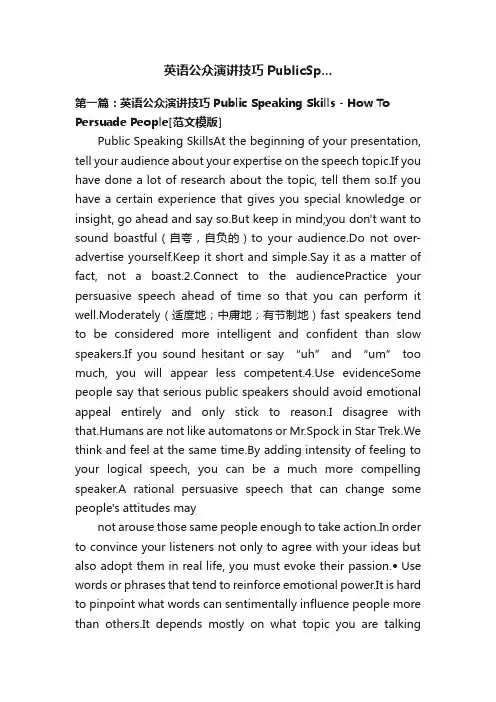
英语公众演讲技巧PublicSp...第一篇:英语公众演讲技巧Public Speaking Skills - How To Persuade People[范文模版]Public Speaking SkillsAt the beginning of your presentation, tell your audience about your expertise on the speech topic.If you have done a lot of research about the topic, tell them so.If you have a certain experience that gives you special knowledge or insight, go ahead and say so.But keep in mind;you don't want to sound boastful(自夸,自负的)to your audience.Do not over-advertise yourself.Keep it short and simple.Say it as a matter of fact, not a boast.2.Connect to the audiencePractice your persuasive speech ahead of time so that you can perform it well.Moderately(适度地;中庸地;有节制地)fast speakers tend to be considered more intelligent and confident than slow speakers.If you sound hesitant or say “uh” and “um” too much, you will appear less e evidenceSome people say that serious public speakers should avoid emotional appeal entirely and only stick to reason.I disagree with that.Humans are not like automatons or Mr.Spock in Star Trek.We think and feel at the same time.By adding intensity of feeling to your logical speech, you can be a much more compelling speaker.A rational persuasive speech that can change some people's attitudes maynot arouse those same people enough to take action.In order to convince your listeners not only to agree with your ideas but also adopt them in real life, you must evoke their passion.• Use words or phrases that tend to reinforce emotional power.It is hard to pinpoint what words can sentimentally influence people more than others.It depends mostly on what topic you are talkingabout and what kind of emotion you would like to arouse in the audience.However, try not to be too wordy or say something overly melodramatic.Your passionate language must suit your speech, otherwise it may strike the audience as ridiculous.• Use vivid personal experience.By telling the audience about your captivating real life story that is relevant to the speech topic, you automatically let your emotional appeal grow.The video below is a great example of how a public speaker can use one's personal experience to one's own advantage.•Unless you are a really competent actor, don't act.Speak with sincerity[sin'serəti] and your true ing emotional language and vivid experience can be pointless if you don't actually feel the emotion yourself.第二篇:公众演讲技巧篇一:公众演说技巧公众演说技巧公众演说--先演再说一、巅峰状态1、一旦我处于巅峰状态,我将拥有所有一切的自信2、一旦我拥有自信,我将拥有所有一切的能力信念的力量是相信的20倍能量就是一切在演说中:肢体动作占55%,语音、语调、气势占38%,文字只占7% 二、二大开关1、感觉的开关:发出wow的声音,效果要好6倍2、引爆肢体动作,挥拳大声确认说:yes,效果要好16倍三、三大形行为法则1、成功者做别人不愿意做的事情2、成功者做别人不敢做的事情3、成功者做别人做不到的事情成功是靠意愿,而不是靠方法成功中:有了80%的why(动机、理由、原因),就能吸引到20%的how(方法)写:十个以上你一定要学公众演说的理由四、成功有四到1、知道――学习(知道很重要,只有知道了才有可能去感悟)2、悟到3、做到4、得到知道不等于悟到,悟到不等于做到,做到不等于得到――只有持续不断地付出才会有回报五、五大学习步骤1、初步的了解2、重复为学习之母3、开始使用4、融会贯通5、再次加强六、学会公众演说的好处1、公众演说可以用一张白纸开公司,瞬间说服一群人2、用一人之力创造十倍、甚至百倍的绩效3、快速倍增自信心,避免组织被控角,化解组织崩盘的危机4、建立影响力最快的一种方法5、最快速累积顶尖人脉的方式6、最快速倍增组织的方式7、最快速开发客户的方式8、最快速令人敬佩你的方式9、最快速吸引人才的方式10、瞬间提升团队战斗力,彻底激发团队潜能的方法七、演说技巧1、练习开场问候2、练习如何破冰3、练习如何互动4、引爆肢体动作和听众情绪5、模仿顶尖人物的三大关键――信念、策略、动作信念的力量是相信的20倍策略是指演说时的方法(动作的先后顺序、都用了什么方法等)八、训练声音和眼神1、训练声音磁性,吸引观众的注意力2、突破心理障碍和爆发力训练3、围成半圆为,组内练习眼神扫视4、组内互相大声问候,并运用眼神(注视5秒以上)九、无懈可击的自我介绍1、设计三分钟无懈可击的自我介绍――好的自我介绍,可以让一个陌生人记住你10年2、任何人一开口,其实就是在做自我介绍3、自我介绍,你将学会包装自己和销售自己4、将自己的绩效和对听众的好处讲出来5、你讲你过去不可思议的绩效(一)为什么要写自我介绍1、自我介绍:只有3分钟让别人眼睛发亮的机会2、你的自我介绍必须让听众发出一连串的“哇”,引起台下人的共鸣3、人们最爱听故事,尤其是自己真实的故事4、你最大的进步来自于无懈可击的自我介绍,要想持续不断的成功与进步,那就每次重写自己无懈可击的自我介绍5、当你自己觉得自己没什么大不了的时候,那就很难进步了6、你要讲的故事决定了你要说服别人的关键7、没有什么难以启齿的事情,讲出来你就是奇迹啊8、自我介绍就是写自己的剧本(剧本的过去、现在和将来)9、自我介绍会改变自己对自己的看法,也可以改变别人对自己的看法(二)写不可思议的自我介绍1、你用什么来说服别人――主题、故事2、你过去有什么样的记录――有什么方面超越别人的(考试、运动等)3、成功的事是记录,失败的事也是记录4、你做过哪些惊天动地的大事5、你有多么远大的梦想6、你未来将缔造多么大的记录7、你即将给大家带来多少兴奋的消息和资讯8、一上台要告诉台下的人有多少顶尖的人欣赏你、推荐你,并与你合作9、不断地回顾过去,并赋予过去价值,讲出来激励更多的人(三)、写出最有影响力的故事1、讲自己的故事(你要用大导演的眼光来看待你的故事)2、写下你生命中最快乐的事情3、写下你生命中最难过的事情4、写下你生命中最令你骄傲的事情5、写下你生命中最难忘、最尴尬的事情6、写下你生命中最感动、最感恩的事情7、写下你生命中最刻骨铭心的事情8、写下你生命中最激励的事情9、讲自己的故事要给别人一个可想象的画面10、写自己的故事:婚姻、老师、追求成功(创业)、合作、好坏朋友(三)自我塑造的问句(排比句)――下面为例句1、你能想象一个高中读了9年都没有毕业的人,是如何成为全国及亚洲知名的百万畅销书创造者的吗?2、你想知道一个完全害怕别人拒绝,一个排斥销售的年轻人,是如何成为行业中的第一名,并在一年中销售过亿的吗?3、你想知道一个昔日在麦当劳洗厕所的人,是如何登上杂志封面,并在电视中面对百万人进行演讲的吗?4、你愿意了解一个不愿与人沟通,没有任何领导经验,失败过无数次的人,是如何通过学习成为了一个在台湾、美国、日本?都拥有公司的集团总总裁吗?篇二:公众演说技巧(演说准备)上公众演说技巧演说准备(上)演说概述(一)演说的必要性随着科技的发展,社会的进步,信息技术能力的提高,现在社会的沟通距离正在逐步缩小,舌头在延长,公众演说蔚然成风,于是让人们产生这样一种观点:“是人才的不见得有口才,但有口才的一定是人才”。

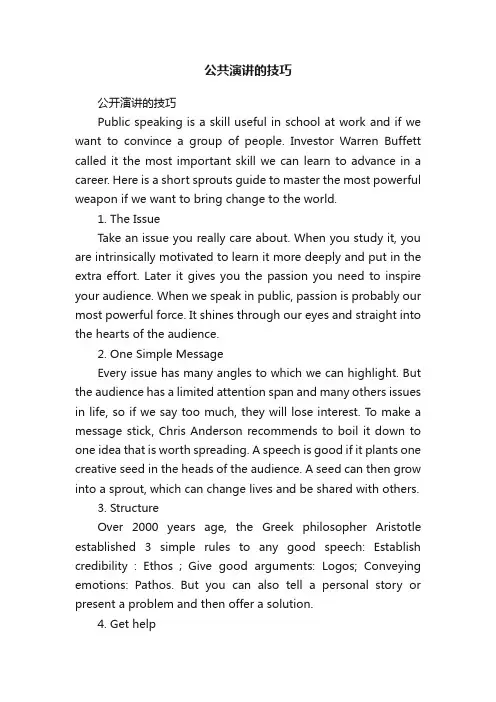
公共演讲的技巧公开演讲的技巧Public speaking is a skill useful in school at work and if we want to convince a group of people. Investor Warren Buffett called it the most important skill we can learn to advance in a career. Here is a short sprouts guide to master the most powerful weapon if we want to bring change to the world.1. The IssueTake an issue you really care about. When you study it, you are intrinsically motivated to learn it more deeply and put in the extra effort. Later it gives you the passion you need to inspire your audience. When we speak in public, passion is probably our most powerful force. It shines through our eyes and straight into the hearts of the audience.2. One Simple MessageEvery issue has many angles to which we can highlight. But the audience has a limited attention span and many others issues in life, so if we say too much, they will lose interest. T o make a message stick, Chris Anderson recommends to boil it down to one idea that is worth spreading. A speech is good if it plants one creative seed in the heads of the audience. A seed can then grow into a sprout, which can change lives and be shared with others.3. StructureOver 2000 years age, the Greek philosopher Aristotle established 3 simple rules to any good speech: Establish credibility:Ethos;Give good arguments: Logos; Conveying emotions: Pathos. But you can also tell a personal story or present a problem and then offer a solution.4. Get helpA good method is using note cards. You can use one card per argument and keep the deck in your hands, alternating them as you speak. Politicians often read their speech from a teleprompter. Professionals often sell their ideas with the help of slides. When you have a product to show, demonstrate it. If you try to memorize your speech and you have one hour, spend 20 minutes studying and 40 minutes practicing to recite it. That’s usually the best ratio.5. Speak Their LanguageIt doesn’t matter what we say, it matters what they hear. According to Nerdwriter, Donald Trump speaks in a way that any fourth-grade can understand him. Guy Kawasaki recommends to use what he calls salient points. People don’twant to know how large a battery is. They want to know how long they can use it. When you prepare, ask yourself, how does my issue matter to this particular audience?6. PracticeBefore you present, practice your delivery. It’s important that we stand upright, arms open, palms out. We should speak loud and clear, and make eye contact with our audience. One way to practice is to try to speak in front of friends who don’t know the topic. Then you will see if they get your point. Alternatively you can also record and watch yourself on video.7. Check Your StageHow big is the room, how many people will listen, will you need a microphone? Professionals will want to walk onto the stage diagonal from the left back, apparently it’s the most dynamic way make an entrance. Also, always have a g lass of water next to you, so you can take a sip wh enever you’re losing it.8. D on’t Be AfraidEverybody can experience speech anxiety, also known as Glossophobia. It’s natural and sometimes actually helps us to reach excellence. Mahatma Gandhi called it “the awful strain of public speaking”. For years it prevented him from speaking up even at friendly dinner parties. But in 1942, Gandhi convinced 60000 people with his Quit India Speech to join a peaceful revolt against British colonialism. He spoke up the people followed his words and the British left.9. Open for SympathyWhen you enter the limelight, wait until you have everyone’s full attention. Then open to win sympathy, also called captatio benevolentiae. One way to do that is to excuse yourself. You can say, “you are a smart audience, so I don’t real ly know what I can tell you…” Obama, opened his 2008 speech in Berlin with the words: “I have to admit that I h ave developed a special place in my heart for the German people”. And they love it.10. Build CuriosityOnce they like you, grab their attention by building curiosity. Present a fact, statistics or a study. Or start in the middle of a story: “on my 5 birth day, my father started crying, it was the day he lost his job.” Dananjaya Hettiarachchi, a champion of public speaking, asked “raise your hand if you have an emotional mother.” And everyone did. But you can also do something funny or open with a crazy stunt. 11. Delivery Your MessageNow make your arguments, share those personal stories and delivermetaphors which create images in the minds of youraudience. If you forget what you wanted to say, don’t worry. Nobody knows what you meant to say. In 1963 Martin Luther King gave a speech in Washington. In the middle of it he stopped reading from script and started to improvise. He delivered one of the greatest speech of the twentieth-century “I have a dream”.12. CloseAfter you are done, summarize your arguments or repeat the core message. But you can also leave them with a quote, share your dream of a new future, or close your speech like we close our videos, with a specific call for action.Here it comes!Write a speech about an important issue, such as education. Open with sympathy, build curiosity, and bring in your convincing argument. In the end, close it cleverly. Limit your speech to 200 words and post it in the comments below.。
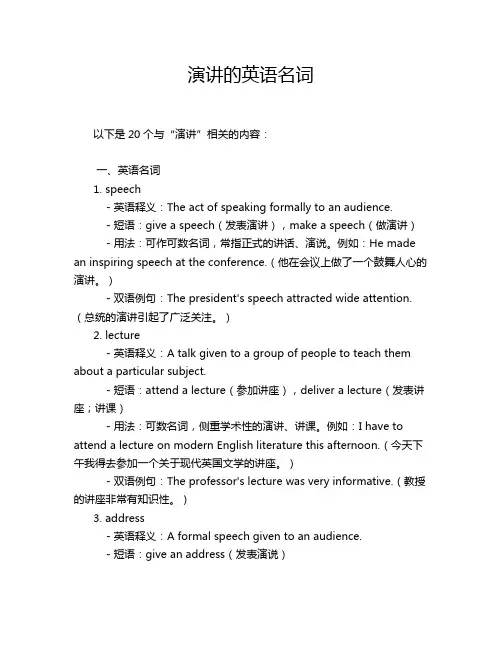
演讲的英语名词以下是20个与“演讲”相关的内容:一、英语名词1. speech- 英语释义:The act of speaking formally to an audience.- 短语:give a speech(发表演讲),make a speech(做演讲) - 用法:可作可数名词,常指正式的讲话、演说。
例如:He made an inspiring speech at the conference.(他在会议上做了一个鼓舞人心的演讲。
)- 双语例句:The president's speech attracted wide attention.(总统的演讲引起了广泛关注。
)2. lecture- 英语释义:A talk given to a group of people to teach them about a particular subject.- 短语:attend a lecture(参加讲座),deliver a lecture(发表讲座;讲课)- 用法:可数名词,侧重学术性的演讲、讲课。
例如:I have to attend a lecture on modern English literature this afternoon.(今天下午我得去参加一个关于现代英国文学的讲座。
)- 双语例句:The professor's lecture was very informative.(教授的讲座非常有知识性。
)3. address- 英语释义:A formal speech given to an audience.- 短语:give an address(发表演说)- 用法:可数名词,常指正式的、有特定目的(如政治、社交等)的演讲。
例如:The prime minister will give an address on national television tonight.(首相今晚将在国家电视台发表演说。
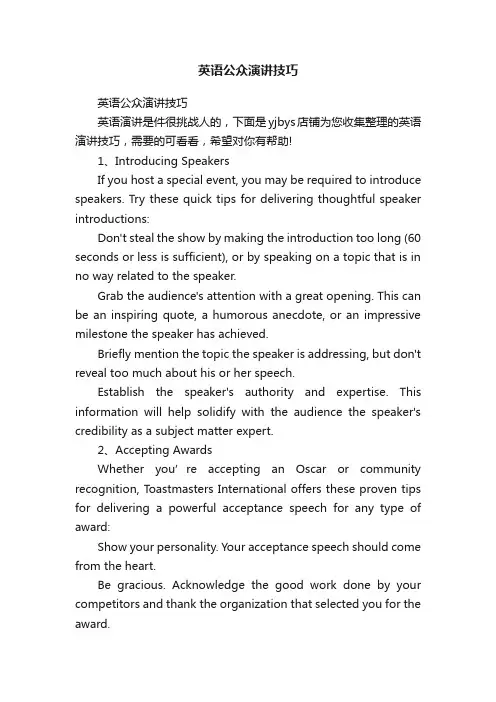
英语公众演讲技巧英语公众演讲技巧英语演讲是件很挑战人的,下面是yjbys店铺为您收集整理的英语演讲技巧,需要的可看看,希望对你有帮助!1、Introducing SpeakersIf you host a special event, you may be required to introduce speakers. Try these quick tips for delivering thoughtful speaker introductions:Don't steal the show by making the introduction too long (60 seconds or less is sufficient), or by speaking on a topic that is in no way related to the speaker.Grab the audience's attention with a great opening. This can be an inspiring quote, a humorous anecdote, or an impressive milestone the speaker has achieved.Briefly mention the topic the speaker is addressing, but don't reveal too much about his or her speech.Establish the speaker's authority and expertise. This information will help solidify with the audience the speaker's credibility as a subject matter expert.2、Accepting AwardsWhether you’re accepting an Oscar or community recognition, Toastmasters International offers these proven tips for delivering a powerful acceptance speech for any type of award:Show your personality. Your acceptance speech should come from the heart.Be gracious. Acknowledge the good work done by your competitors and thank the organization that selected you for the award.Show excitement. You don’t have to climb over chairs or even cry, but the audience should recognize that you’re happy to have won the award.Be modest. Your acceptance speech should be heartfelt but not self-congratulatory.Practice, practice, practice. Rehearse with a timer, memorize key people to thank and allow time for the unexpected.3、Preparing a SpeechPreparing for a speech is one of the best ways to ensure you give an effective presentation. Try these tips to help you properly prepare:Organize your speech in a logical sequence: opening, main points, summary.Practice and rehearse a speech frequently prior to delivering it. Ask friends to be your audience, or practice in front of a mirror. Be sure to use a timer to help you pace your speech.Become familiar with the stage or the setting where the speech will take place. Get a sense of the size of the stage, where any steps or obstacles might be, and where to enter and exit.Choose comfortable clothes to wear, but always maintain a professional appearance.Visual aids should fit a speech, whether they are funny, serious or technical. The main goal of visual aids is to help the audience understand what is being said, and reinforce the points of a speech in unique and interesting ways.4、Gestures and Body LanguageSpeakers generate a great amount of emotion and interest through the use of non-verbal communication, often called gestures or body language. A speaker's body can be an effective tool for emphasizing and clarifying the words they use, whilereinforcing their sincerity and enthusiasm. Here are a few tips on how to use gestures effectively:Eye contact establishes an immediate bond with an audience, especially when a speaker focuses in on individual listeners rather than just gazing over the audience as a whole.Control mannerisms. Mannerisms are the nervous expressions a speaker might not be aware of such as putting their hands in their pockets, nodding their head excessively, or using filler words like um and ah too often.Put verbs in to action when speaking to an audience by physically acting them out with the hands, face or entire body.Avoid insincere gestures by involving the entire body as much as possible in the movement and matching facial expressions to it.Move around the stage as topics change and move toward the audience when asking questions, making critical connections, or offering a revelation.5、Successful SpeechesWhether you're talking to a small group of people or speaking to a large audience, you want to be sure your speech is memorable and enjoyable. Follow these five easy tips to help ensure your speech delivers:Be prepared. Your audience is giving you their time and consideration, so rehearse enough to be confident you'll leave a good impression.Start strong. Begin your speech with a powerful opening that will grab your audience's attention, such as a startling fact or statistic, an interesting story or a funny joke.Be conversational. Avoid reading your speech word for word. Instead, refer to notes or points from an outline to help yourspeech have a more free-flowing, conversational tone.Speak with passion. If you're truly invested in what you're saying, you'll be better able to keep your audience's attention.Be patient. It's easy to get frustrated if you make a mistake. But remember that public speaking is not easy and it takes time to hone your skills. Keep practicing and you will reach your goals.6、Speaking to Diverse AudiencesGiving a speech or presentation to an audience of people who speak various languages or have differing cultural backgrounds requires special tact on the part of the speaker. Here are some tips and techniques on how to effectively engage a diverse audience:Enunciate clearly. If possible, try to speak with a neutral accent to better include all audience members.Don't speak too fast. Remember that the normal pace of speech in one language might become incomprehensible for people relatively new to that language.Be careful with metaphors. Some metaphors that are appropriate in one culture can be offensive to another. A good example is references to sports not popular or practiced in a certain country, or phrases that are comical in one culture yet offensive in another.Know the meanings of words outside your native language. Unless you are absolutely sure of the meaning and pronunciation of a word you are using in a given language, do not use it. In some languages, slight variations of a vowel will completely alter the meaning of a word.Avoid slang, jargon and idiomatic expressions. Diverse audiences may not understand slang from a given country. English phrases such as "that dog don't hunt" or "cool as acucumber" might be colorful, but the meaning could be lost on a large part of the audience.Be mindful of body language, eye contact and personal space. Posture, mannerisms and eye contact speak volumes and what is taken for granted in one culture might be considered offensive in another.7、Presenting AwardsWhen recognizing someone for a job well done, it's important to highlight the value of both the award and the recipient. To create a memorable presentation, explain the criteria for the award and how the recipient met those criteria. Here are a few additional guidelines:Tell a story about the significance of the award.Pronounce names of the recipients correctly.Provide background on the recipient.Hold the award respectfully and hand it to the recipient as if it were a treasure.Wait to invite the recipient to the lectern until you formally introduce them.Stand so the audience can see the recipient and the award clearly.8、Delivering Technical BriefingsA technical briefing is a speech that conveys technical information to a specific audience, usually in a workplace.Technical briefings should be presented in a way that allows an audience to understand and apply critical information. Technical briefings can range from an engineer briefing a group of managers on a current project, to a retail supervisor explaining a new company policy to the store employees. Follow the steps below to ensure your technical briefings are as effective as theycan be:Know your audience. Avoid using too much industry jargon or material that is too technical for your colleagues to easily understand.State the purpose of the technical briefing in one or two sentences and use this summary as the focal point for the entire presentation.Arrange the material into an outline containing an introduction, main points and a conclusion.Summarize the main points of the technical briefing during the conclusion.9、Giving Sales PitchesA sales pitch or proposal seeks to persuade. The objective of the presentation is to sell a product, concept or idea. The ability to present sales pitches and proposals effectively can open the door to professional opportunities.To organize ideas into an effective sales pitch or proposal, use the “inverted pyramid” approach, which gives an audience the most important information in the first few sentences (how much money might be saved, how lives might be improved, etc.). Support claims with logic and evidence, and end every sales pitch or proposal with a call to action. If an audience agrees with the initial message or point, the supporting material that follows will reinforce that agreement. If an audience disagrees, logic and evidence may win them over.Use high-quality yet simple visual aids, such as charts or slides, to help clarify any sales pitch or proposal. Make sure the visual aids can be seen by every person in the audience, and limit each chart or slide to a single main point.Offer a question-and-answer period following a sales pitchor proposal, which can supply you with valuable feedback about the effectiveness of the pitch. It also gives an audience the opportunity to further clarify specific points or data that was presented. Below are a few ways to effectively answer questions from an audience:Anticipate possible questions by rehearsing with colleagues or friends.Provide answers that support the sales pitch or proposal.Disarm loaded questions (those based on false premises or irrelevant assumptions) by being polite and asking the questioner to further explain his or her question.Divide complicated questions into several parts before answering them.。
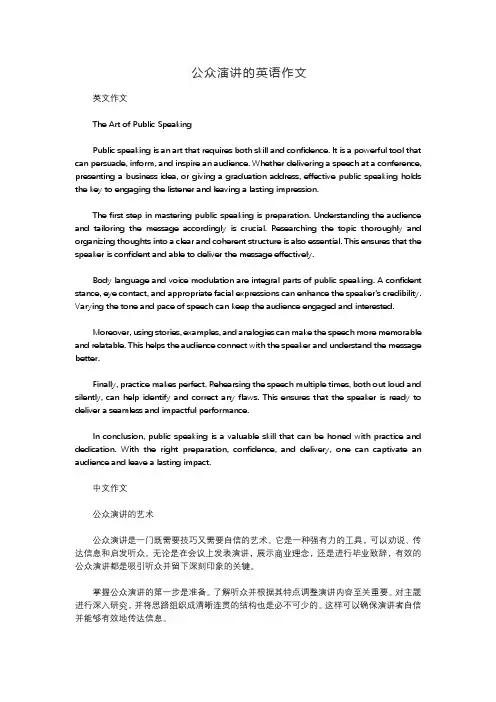
公众演讲的英语作文英文作文The Art of Public SpeakingPublic speaking is an art that requires both skill and confidence. It is a powerful tool that can persuade, inform, and inspire an audience. Whether delivering a speech at a conference, presenting a business idea, or giving a graduation address, effective public speaking holds the key to engaging the listener and leaving a lasting impression.The first step in mastering public speaking is preparation. Understanding the audience and tailoring the message accordingly is crucial. Researching the topic thoroughly and organizing thoughts into a clear and coherent structure is also essential. This ensures that the speaker is confident and able to deliver the message effectively.Body language and voice modulation are integral parts of public speaking. A confident stance, eye contact, and appropriate facial expressions can enhance the speaker's credibility. Varying the tone and pace of speech can keep the audience engaged and interested.Moreover, using stories, examples, and analogies can make the speech more memorable and relatable. This helps the audience connect with the speaker and understand the message better.Finally, practice makes perfect. Rehearsing the speech multiple times, both out loud and silently, can help identify and correct any flaws. This ensures that the speaker is ready to deliver a seamless and impactful performance.In conclusion, public speaking is a valuable skill that can be honed with practice and dedication. With the right preparation, confidence, and delivery, one can captivate an audience and leave a lasting impact.中文作文公众演讲的艺术公众演讲是一门既需要技巧又需要自信的艺术。
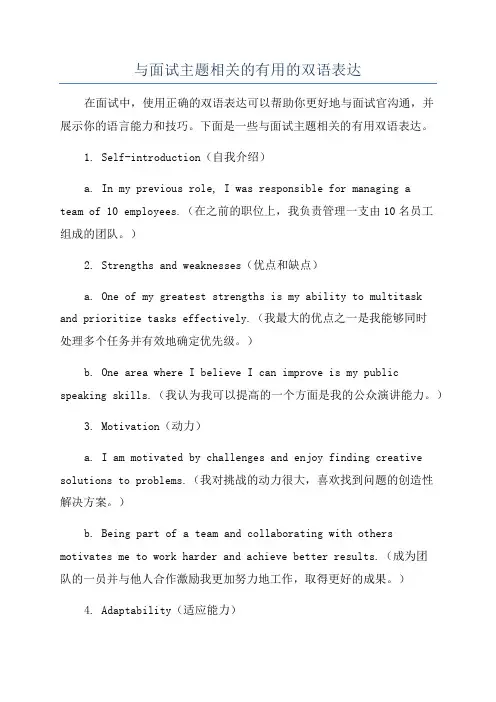
与面试主题相关的有用的双语表达在面试中,使用正确的双语表达可以帮助你更好地与面试官沟通,并展示你的语言能力和技巧。
下面是一些与面试主题相关的有用双语表达。
1. Self-introduction(自我介绍)a. In my previous role, I was responsible for managing ateam of 10 employees.(在之前的职位上,我负责管理一支由10名员工组成的团队。
)2. Strengths and weaknesses(优点和缺点)a. One of my greatest strengths is my ability to multitask and prioritize tasks effectively.(我最大的优点之一是我能够同时处理多个任务并有效地确定优先级。
)b. One area where I believe I can improve is my public speaking skills.(我认为我可以提高的一个方面是我的公众演讲能力。
)3. Motivation(动力)a. I am motivated by challenges and enjoy finding creative solutions to problems.(我对挑战的动力很大,喜欢找到问题的创造性解决方案。
)b. Being part of a team and collaborating with others motivates me to work harder and achieve better results.(成为团队的一员并与他人合作激励我更加努力地工作,取得更好的成果。
)4. Adaptability(适应能力)a. I am skilled at adapting to new environments and quickly learning new technologies or systems.(我善于适应新环境,并能够迅速学习新的技术或系统。

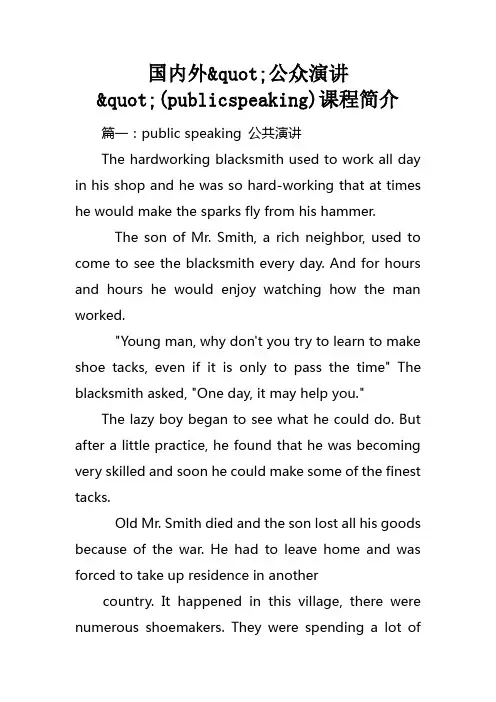
国内外"公众演讲"(publicspeaking)课程简介篇一:public speaking 公共演讲The hardworking blacksmith used to work all day in his shop and he was so hard-working that at times he would make the sparks fly from his hammer.The son of Mr. Smith, a rich neighbor, used to come to see the blacksmith every day. And for hours and hours he would enjoy watching how the man worked."Young man, why don't you try to learn to make shoe tacks, even if it is only to pass the time" The blacksmith asked, "One day, it may help you."The lazy boy began to see what he could do. But after a little practice, he found that he was becoming very skilled and soon he could make some of the finest tacks.Old Mr. Smith died and the son lost all his goods because of the war. He had to leave home and was forced to take up residence in anothercountry. It happened in this village, there were numerous shoemakers. They were spending a lot ofmoney to buy tacks for their shoes. Although they paid high prices, they were not always able to get what they wanted, because in that part of the country there was a high demand for soldier shoes.Our young Mr. Smith, who was finding it difficult to earn his daily bread, remembered that once upon a time he had learned the art of making tacks. He had the sudden idea of making a bargain with the shoemakers. He told them that he would make the tacks if they would help to get him settled in his own workshop. The shoemakers were only too glad of the offer. And after a while, Mr. Smith found that he was soon making the finest tacks in the village."How funny it seems," he used to say, "Even making tacks can bring a fortune. My trade is more useful to me than all my former riches."If the young Smith refused to learn to make tacks, this tiring skill when he was rich, how can he keep alive while he lost everythingA small decision may change your life.篇二:口译课程大纲Framework of the CourseI. The Basics and Basic Principles in Consecutive Interpreting什么是口译?口译和笔译有何不同口译的方式和口译的类型口译的质量要求译员的素质要求口译的大体步骤和工作原理II.Listening in CI:从语音听辨到语流听辨从听词到听意意群切分主题信息识别及提取III. Memory in CI:口译记忆的基本原理逻辑线索及信息整合口译记忆的技能言语类型分析IV.Numbers in CI数字口译基本方式数字和信息的结合V.Language Transfer in CI口译中的句法转化VI.Coping Tactics in CI口译中临场应变技巧VII.Note taking in CI记什么?怎么记?(格式问题)缩写和符号的利用记录语言何时开始记怎么读取笔记VIII.Public Speaking为何要训练公众演讲公众演讲技巧如何克服口译现场的怯场IVV. How to Prepare a Conference译前准备篇三:公共演讲的益处Benefits of Public Speaking公共演讲的好处Benefits of Public SpeakingPublic speaking is bothinteresting and challenging. It is interesting because it asks you to come to abetter understanding of human nature and human communication. It is challengingbecause it asks you to take a risk, to put yourself in a situation where youcan succeed or fail in your effort to make a difference. As you go further,however, you will find more benefits of public speaking go beyond learning howto express yourself orally. The process of your speaking improvessuchpractical skills as the following:公众演讲既有趣也有挑战性。
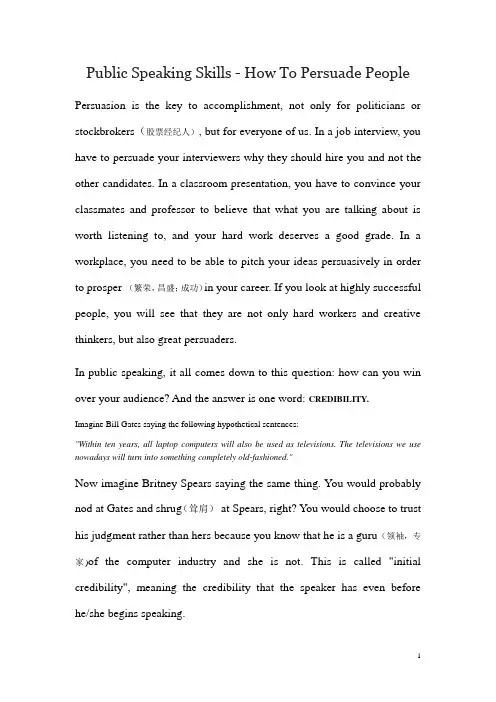
Public Speaking Skills - How To Persuade People Persuasion is the key to accomplishment, not only for politicians or stockbrokers(股票经纪人), but for everyone of us. In a job interview, you have to persuade your interviewers why they should hire you and not the other candidates. In a classroom presentation, you have to convince your classmates and professor to believe that what you are talking about is worth listening to, and your hard work deserves a good grade. In a workplace, you need to be able to pitch your ideas persuasively in order to prosper (繁荣,昌盛;成功)in your career. If you look at highly successful people, you will see that they are not only hard workers and creative thinkers, but also great persuaders.In public speaking, it all comes down to this question: how can you win over your audience? And the answer is one word: CREDIBILITY.Imagine Bill Gates saying the following hypothetical sentences:"Within ten years, all laptop computers will also be used as televisions. The televisions we use nowadays will turn into something completely old-fashioned."Now imagine Britney Spears saying the same thing. You would probably nod at Gates and shrug(耸肩)at Spears, right? You would choose to trust his judgment rather than hers because you know that he is a guru(领袖,专家)of the computer industry and she is not. This is called "initial credibility", meaning the credibility that the speaker has even before he/she begins speaking.Initial credibility is a blissful(充满喜悦的)advantage for public speakers. If your audience already knows you are an expert in something and already trusts you, you won't have to try so hard to create credibility in your speech. But what if you are not really an expert in anything and your audience doesn't even know who you are? The answer is simple: you will have to build your credibility during your speech.How to Build Your Credibility1. Advertise your competence - At the beginning of your presentation, tell your audience about your expertise on the speech topic. If you have done a lot of research about the topic, tell them so. If you have a certain experience that gives you special knowledge or insight, go ahead and say so. But keep in mind; you don't want to sound boastful(自夸,自负的)to your audience. Do not over-advertise yourself. Keep it short and simple. Say it as a matter of fact, not a boast.2. Connect to the audience - Try to identify with(认为…等同于,与一致)your audience early in your speech. Even if you are going to talk about something very controversial or something your listeners may disagree with, you still have to make them feel that you share the same common ground and values.Four years ago, I watched Senator John Kerry give a speech about keeping woman's rights to abortion in one of the "red" states, in a roomfull of conservative voters who were probably strongly against such an idea. At the start of his speech, he made a very smart move by saying that he himself is also a true Christian who believes abortion is not the right thing to do. Then he explained further that even though that is what he believes, there are also a lot of people in America who do not consider abortion a sinful(有罪的)thing; there are a number of Americans who are not Christians and do not share his religious principles. And since America is a democratic country, we have to respect those people's values as well.I think Senator Kerry was impressive that day. By establishing common ground with the audience early, he was able to get off on the right foot. I don't know how many people in the audience he had successfully convinced, but at least he pulled off that extremely controversial speech with such poise and more importantly, without getting booed.3. Speak eloquently(['eləkwəntli]善辩地;富于表现力地)and express your ideas with conviction - Practice your persuasive speech ahead of time so that you can perform it well. Moderately(适度地;中庸地;有节制地)fast speakers tend to be considered more intelligent and confident than slow speakers. If you sound hesitant or say "uh" and "um" too much, you will appear less competent.4. Use evidence - For amateur public speakers with no initial credibility,it is very helpful to use examples, statistics, facts or testimonies to support their ideas. No matter what type of evidence you use in your speech, just remember these two things:First, use specific evidence. For example, if you use statistics, indicate the exact number. Saying "Ten million Americans suffer from obesity" will make your point more effectively than just saying "Millions of Americans suffer from obesity." It will make your listeners aware that you have a good firm grip of factual information. Second, always cite evidence from well-known, reliable and non-biased sources.5. Reason clearly and persuasively- Even if you use a bunch of strong evidence, you still won't be able to persuade your audience unless they grasp your reasoning. Don't assume that supportive evidence is enough. Throwing a lengthy list of statistics and examples at your listeners without drawing a logical conclusion to your main idea won't do you any good.6. Appeal to emotions- Some people say that serious public speakers should avoid emotional appeal entirely and only stick to reason. I disagree with that. Humans are not like automatons or Mr. Spock in Star Trek. We think and feel at the same time. By adding intensity of feeling to your logical speech, you can be a much more compelling speaker. A rational persuasive speech that can change some people's attitudes maynot arouse those same people enough to take action. In order to convince your listeners not only to agree with your ideas but also adopt them in real life, you must evoke their passion.How to create emotional appeal∙Use words or phrases that tend to reinforce emotional power. It is hard to pinpoint what words can sentimentally influence people more than others. It depends mostly on what topic you are talking about and what kind of emotion you would like to arouse in the audience.However, try not to be too wordy or say something overly melodramatic. Your passionate language must suit your speech, otherwise it may strike the audience as ridiculous.∙Use vivid personal experience. By telling the audience about your captivating real life story that is relevant to the speech topic, you automatically let your emotional appeal grow. The video below is a great example of how a public speaker can use one's personal experience to one's own advantage.∙Unless you are a really competent actor, don't act. Speak with sincerity[sin'serəti]and your true emotion. Using emotional language and vivid experience can be pointless if you don't actually feel the emotion yourself.。
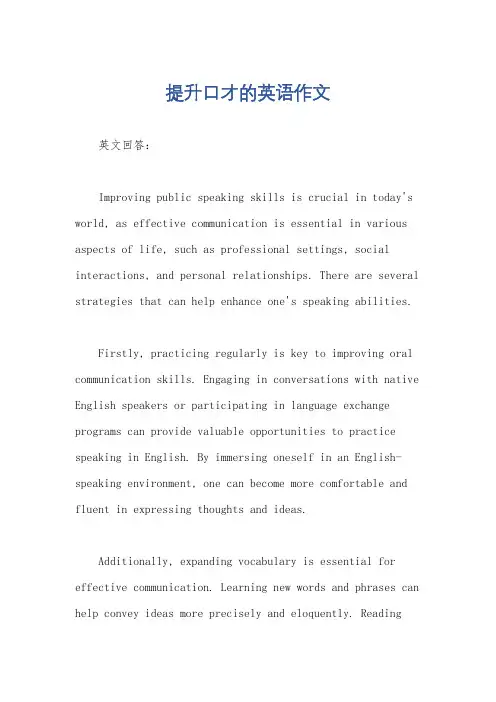
提升口才的英语作文英文回答:Improving public speaking skills is crucial in today's world, as effective communication is essential in various aspects of life, such as professional settings, social interactions, and personal relationships. There are several strategies that can help enhance one's speaking abilities.Firstly, practicing regularly is key to improving oral communication skills. Engaging in conversations with native English speakers or participating in language exchange programs can provide valuable opportunities to practice speaking in English. By immersing oneself in an English-speaking environment, one can become more comfortable and fluent in expressing thoughts and ideas.Additionally, expanding vocabulary is essential for effective communication. Learning new words and phrases can help convey ideas more precisely and eloquently. Readingbooks, newspapers, and articles, as well as watching movies and TV shows in English, can expose individuals to a wide range of vocabulary and idiomatic expressions.Furthermore, listening to native English speakers and mimicking their pronunciation and intonation can greatly improve speaking skills. Paying attention to the rhythm and melody of the language helps in sounding more natural and confident while speaking. Utilizing online resources, such as podcasts or language learning apps, can provide access to authentic English conversations and help improve listening and speaking skills simultaneously.Moreover, gaining confidence in public speaking can be achieved through joining public speaking clubs or taking part in debates and presentations. These activities provide a platform to practice speaking in front of an audience, allowing individuals to overcome stage fright and develop effective speaking techniques.In conclusion, improving oral communication skills in English requires regular practice, expanding vocabulary,listening to native speakers, and gaining confidence through public speaking activities. By implementing these strategies, one can become a more effective and confident speaker.中文回答:提升口才对于现今的社会至关重要,因为有效的沟通在各个方面都非常重要,如职业环境、社交互动和个人关系。
英语专业《交替传译》教学大纲一、课程的地位与任务(一)课程地位本课程是为英语专业高年级学生开设的专业必修课程。
根据教育部英语教学大纲对本课程的具体要求,向学生介绍交替传译的特点与技能,着重训练交替传译有关技巧,(二)课程目标课程结束后,学生能(1)掌握基本口译技能;(2)完成一般外事活动的交替传译工作,并为同声传译的入门和后续系统训练奠定基础。
二、课程目标达成的途径与方法以课堂教学为主,结合自学、课堂讨论、课外作业、小组大作业模拟会议等多种形式。
课堂教学注重情境和模拟,学生每周需要进行相应自学,并在课堂进行讨论和平叛,模拟会议则是每位同学必须参加,了解真实口译场景。
三、课程目标与相关毕业要求的对应关系标2|||||||||注:支撑强度分别填写H、M或L (其中H表示支撑程度高、M为中等、L为低)。
四、课程主要内容与基本要求主要内容:1.交替传译简史了解交替传译简史。
2.交替传译的特点、标准和译员素质了解交替传译的特点、标准和译员素质。
3.交替传译技能介绍及训练掌握交替传译技能,并能熟练运用到实际操作中,具体包括:1)口译短期记忆(short-term memory);2)数字翻译技巧(figures/numbers):3)口译笔记(Note-taking);4)口译笔记阅读(note-reading):5)演说技巧(public speaking skills);6)连续传译理解原则(principles of CI understanding);7)言语类型分析(analysis of speech-type):8) 主题思想识别(identification of main ideas);9)目的语信息重组(Reconstruction);10) 口译应对策略(coping tactics);11)译前准备技巧(preparation);12)跨文化交际技巧(cross-cultural communication)®4.综合练习熟练掌握交替传译各项技巧,并熟练运用到练习中。
仲伟合,1966年出生。
广东外语外贸大学英文学院副院长、翻译学副教授、硕士研究生导师。
南京师范大学英语语言文学学士、翻译学硕士;英国Westminster大学口笔译学硕士、英国Warwick大学翻译学博士生。
研究方向:翻译学宏观研究、翻译与跨文化交际、英汉口笔译教学与理论研究。
多次担任广东省对外交流的首席口译员,人称“华南第一翻”。
1.口译的训练内容口译训练应以口译技能(技巧)训练为主。
国内目前的口译训练方式大多以题材训练为主,即在一学年(或一学期)的教学中,介绍专题口译为主,突出专题术语的翻译。
口译练习也是从单句,到段落再到篇章的翻译。
也有少数学校是以口译技能的训练为主的(如广外、厦门大学等),即在训练中不强调翻译内容的题材,循序渐进介绍口译活动中可以切实应用的技能(技巧)。
笔者认为口译的训练还是应以技能训练为主。
“授人以鱼,不如授人以渔”。
我们在实际的口译工作中可以遇到的题材千千万万,但是应用于各种题材的翻译技巧确是有限的。
因此,我们应该合理、有效地应用课堂上的时间,更多地介绍可以应用于各种场合与题材的口译的技巧与技能。
根据口译实践的需求,要循序渐进介绍给学生的口译技能应包括:(1)连续传译技能(Consecutive Intertpreting Skills)技能名称训练目的训练方法口译短期记忆(short-term memory) 主要训练译员的短期记忆能力,准确理解发言者的讲话内容。
1.单语复述练习2.单语延迟复述练习3.译入语复述练习口译笔记(Note-taking) 口译笔记有别于会议记录,也不是速记。
口译笔记是辅助记忆的手段,是在听讲过程中用简单文字或符号记下讲话内容中能刺激记忆的关键词。
本技能的训练应贯穿口译训练的前期过程。
帮助译员(1)建立一套可行的笔记符号;(2)常用词的口译笔记速写口译笔记阅读(note-reading)根据笔记的内容组织语言、归纳主题可设计给出几个核心词,要求学员根据核心词综述出一段内容连续传译理解原则(principles of CI understanding)训练学员对原语的理解。
英语公众演讲技巧演讲稿是一种运用非常广泛的文体,无论在会议上,还是在演讲比赛上,都能够派的上用场,一篇好的演讲稿是需要一种鼓舞人心的力量的,同时,还要让听众信服,充分地体现演讲者的人格魅力。
下面是中国人才网提供的英语公众演讲技巧,供参考借鉴!1.充分准备和练习在演讲的过程中感到紧张是因为面对很多的观众不太适应,同时害怕忘记背诵的某些内容,造成尴尬局面。
练习,练习,再练习,直到你根本不用看稿。
要争取在不同的场合和不同的人面前练习。
2.选择一个你感兴趣的题目如果对选择的题目不感兴趣,我们就不可能演讲得有激情飞扬,也不能够打动观众。
选择你自己熟悉,最好能加入一些你个人魅力的题目,所以如果演讲完有即兴问题的话,你也能从容回答。
注意文字的撰写,使其便于长期记忆。
3.不要忘记观众把观众拉近,和你的观众互动,他们的好奇心和注意力就会被吸引过来。
不然有些观众就会走神或者打盹了。
4.了解你的观众要根据你的观众来设计你的演讲.难易深浅和兴趣点5.演讲要便于理解不是每个人都能理解和听懂你所说的话。
观众听不懂,就没有耐心在认真听。
如果你一定要用复杂的术语和词汇的话,那一定要在后面配上易于理解的例子。
6. 用视觉工具来帮忙使用幻灯、多媒体、投影仪或其它工具,看到的内容让大家会理解得更好。
7.穿着得体穿着正式告诉观众你对次很重视。
8.给你观众有思考的空间在结束演讲时,给观众思考的空间,这样既可以引起观众的好奇心,同时也可以使你的演讲印象深刻。
无论是你的仪表还是你演讲的方式都很重要。
通过练习,我们能够减轻公共演讲时的紧张和焦虑。
速度速度适中,带着自信,我们能慢慢地吸引观众的注意力,最终达到良好的演讲效果。
英语演讲稿FriendshipEvery one of us, rich or poor, should at least have one or two good friends. My friends will listen to me when I want to speak, will wipe my eyes when I cry, will take care of me when I am sick, and my friends will go together with me side by side through this journey of life.As students, we could share more time with our friends. The friendship in our young hearts is pure, fresh and simple. I often feel very lucky to have a lot of good friends. Especially when I had Justin as one of my best friends. Justin was my English teacher from the USA. I met him in 1996 when I was a student who could only speak very little English. Justin was a vivid young man with a bright smile on his face, and he always had his special way to make the class active and attractive. He taught us English by telling stories, playing games, singing songs, and even dancing. I could still remember very clearly that one afternoon when we fin-ished our class, we went to some other classes to sing songs for them, just like what people do in the states on Christmas Eve. It was so interesting and unforgettable. Justin was an excellent teacher, because he taught us not only how to study English well, but also the way to find out the beauty of the world and the way to be angels to others' lives. I know there was friendship and pure love in our hearts. Facing this valuable emotion neither nationality nor age was important, the real importance lay in faith,under-standing, and care. Justin is the best friend I have ever had, and I know I will cherish those days of staying together with him as the best part of my memory.Friendship is a kind of treasure in our lives. It is actually like a bottle of wine, the longer it is kept, the sweeter it will be. It is also like a cup of tea. When we are thirsty, it will be our best choice, but when we have enough time to enjoy ourselves, it is also the most fragrant drink.However, in this fast-developing modern society, the reality is not that. More and more people forget to enjoy the beauty of life and -the beauty of friendship. They work hard in order to gain a higher position, in the society and to earn more money for their work. Of course, we don't deny that it is important to find a bet-ter place in our lives, but we wish more and more people could pay a little more attention to themselves and their friends. All of us have to spare some time for personal lives. We have to find the chance to express our emotion and love. When staying with our friends, we can release ourselves completely. We can do whatever we want, we can laugh together, talk together, and even cry to-gether. I should say that being together with our best friends is the most wonderful moment of our lives.As we know, we would feel lonely if we didn't even have a friend. But it doesn't mean we could depend on our friends all the time. There is a famous motto saying that “A friend is like a quilt with cotton wadding, but the real thing that keeps you warm is your own temperature.” It is really true. We have to work hard together with our friends, encourage each other and help each other. When we receive love and friendship, we should repay as much as we can.Finally, let's pray together now that one day, all of us couldfind the person we want to find, and could enjoy a real beautiful friendship in our lives. Let's pray the flower of friendship be-tween our friends and us would always bloom brightly in our hearts.。
国内外“公众演讲”(PublicSpeaking)课程简介开设“公众演讲”(PublicSpeaking)课程在西方高校中早已成为惯例。
早在古希腊时,苏格拉底等人的弟子就以“雄辩术”作为其必修内容。
但在中国,演讲课程尤其是英语演讲课得以“进驻”大学课堂却还是一件新鲜事。
尽管国内英文演讲赛事蓬勃发展,各高校也开始重视培养学生的口头表达能力,但英文演讲课程在我国却只能称得上是“襁褓中的婴儿”。
随着本周第十二届“21世纪联想杯”全国英语演讲比赛在香港拉开帷幕,高校英文演讲课程再次成为业内关注的话题。
仍是新兴课程记者在采访中了解到,随着英语演讲热在中国的兴起,国内为数不多的院校,例如北京外国语大学、对外经济贸易大学、四川大学、华东理工大学等近年来先后开设了诸如“英语演讲”“公众演讲”“演讲辩论”等课程,该课程一般面向高年级学生作为选修课学习,并计入课程总学分。
南京大学外国语学院英语系副主任王文宇教授告诉记者,英文演讲课的重要性勿庸置疑,它有助于加强学生的英语应用能力,应该纳入教学计划。
据悉,该校已经把“演讲与辩论”作为英语专业综合素质课程的重要部分。
据了解,英文演讲课程不仅能帮助学生进一步提高英语表达能力,更有利于其开拓思路、掌握沟通技巧,为今后走上工作岗位奠定基础,甚至还可以让学生从容自信地走上国际舞台,在意义重大的国际会议上,在唇枪舌战的谈判桌上,在跨文化交流的讲台上妙语连珠,一展风采。
目前,已经有更多的院校正计划将“英语演讲”设为选修课。
上海外国语大学英语学院院长梅德明教授告诉记者,该院已经将“公众演讲艺术与口译”作为重要课程立项向学校提出申报,预计今年将在英语专业学生中开设此课程。
“但还有许多学校没有迈出这一步。
”梅教授对记者坦言。
对外经济贸易大学英语学院“英语公众演讲”课教师宿玉荣曾在美国师从威斯康星大学麦迪逊总校演讲学知名学者Stephen E. Lucas教授学习公众演讲,回国后开始从事英文演讲课教学。
以下是八个适合初中生的英语角话题:1.我的假期(My Vacation)这个话题可以让学生分享他们暑假或寒假的经历,以激发他们的讲述英语口语的兴趣和欲望。
老师可以提供一些问题和提示词如“Where did you go?”, “What did you do during your vacation?”, “Did you meet any interesting people?”等等,这有助于使学生描述自己的假期,并让他们跟其他同学交流自己的经历。
2.我的家庭(My Family)学生可以分享自己对家庭成员的个人认识和印象,从而加深他们对不同词汇的理解和应用。
老师可以引导学生制作一个家庭树,并让学生描述每个家庭成员的特点,如他们的姓名,职业,爱好,个性,等等。
3.我的梦想(My Dream)这个话题可以让学生提高他们侧重于未来的意识和目标,以及让他们为自己设定一个个人追求。
老师可以问学生些问题如“What do you want to do when you grow up?”, “What are your plans for the future?”, “What do you dream of achieving in your life?”,这有助于学生成为自己的梦想制定具体的计划,并让他们分享自己的愿望和目标。
4.健康的饮食习惯(Healthy Eating Habits)这个话题可以激发学生关于健康饮食习惯的兴趣,为他们提供价值和知识。
老师可以提供一些问题和提示词如“What kind of food do you like to eat?”, “What are some healthy foods you can eat?”, “What are some unhealthy habits you need to avoid?”,这将有助于学生了解健康饮食习惯的好处,更加健康地生活。
英语公共演讲技巧篇一:英语公众演讲技巧Public Speaking Skills - How To Persuade PeoplePublic Speaking Skills - How To Persuade People Persuasion is the key to accomplishment, not only for politicians or stockbrokers(股票经纪人), but for everyone of us. In a job interview, you have to persuade your interviewers why they should hire you and not the other candidates. In a classroom presentation, you have to convince your classmates and professor to believe that what you are talking about is worth listening to, and your hard work deserves a good grade. In a workplace, you need to be able to pitch your ideas persuasively in order to prosper (繁荣,昌盛;成功)in your career. If you look at highly successful people, you will see that they are not only hard workers and creative thinkers, but also great persuaders.In public speaking, it all comes down to this question: how can you win over your audience And the answer is one word: CREDIBILITY.Imagine Bill Gates saying the following hypothetical sentences:"Within ten years, all laptop computers will also be used as televisions. The televisions we use nowadays will turn into something completely old-fashioned."Now imagine Britney Spears saying the same thing. You would probably nod at Gates and shrug(耸肩) at Spears, right You would choose to trust his judgment rather than hers because you know that he is a guru (领袖,专家)of the computer industry and she is not. This is called "initial credibility", meaning the credibility that the speaker has even before he/she begins speaking.Initial credibility is a blissful(充满喜悦的)advantage for public speakers. If your audience already knows you are an expert in something and already trusts you, you won't have to try so hard to create credibility in your speech. But what if you are not really an expert in anything and your audience doesn't even know who you are The answer is simple: you will have to build your credibility during your speech.How to Build Your Credibility1. Advertise your competence - At the beginning of your presentation, tell your audience about yourexpertise on the speech topic. If you have done a lot of research about the topic, tell them so. If you have a certain experience that gives you special knowledge or insight, go ahead and say so. But keep in mind; you don't want to sound boastful(自夸,自负的) to your audience. Do not over-advertise yourself. Keep it short and simple. Say it as a matter of fact, not a boast.2. Connect to the audience - Try to identify with (认为…等同于,与一致)your audience early in your speech. Even if you are going to talk about something very controversial or something your listeners may disagree with, you still have to make them feel that you share the same common ground and values.Four years ago, I watched Senator John Kerry give a speech about keeping woman's rights to abortion in one of the "red" states, in a roomfull of conservative voters who were probably strongly against such an idea. At the start of his speech, he made a very smart move by saying that he himself is also a true Christian who believes abortion is not the right thing to do. Then he explained further that even though that is what he believes, there arealso a lot of people in America who do not consider abortion a sinful(有罪的)thing; there are a number of Americans who are not Christians and do not share his religious principles. And since America is a democratic country, we have to respect those people's values as well.I think Senator Kerry was impressive that day. By establishing common ground with the audience early, he was able to get off on the right foot. I don't know how many people in the audience he had successfully convinced, but at least he pulled off that extremely controversial speech with such poise and more importantly, without getting booed.3. Speak eloquently(['elkwntli]善辩地;富于表现力地)and express your ideas with conviction - Practice your persuasive speech ahead of time so that you can perform it well. Moderately(适度地;中庸地;有节制地)fast speakers tend to be considered more intelligent and confident than slow speakers. If you sound hesitant or say "uh" and "um" too much, you will appear less competent.4. Use evidence - For amateur public speakers withno initial credibility,it is very helpful to use examples, statistics, facts or testimonies to support their ideas. No matter what type of evidence you use in your speech, just remember these two things:First, use specific evidence. For example, if you use statistics, indicate the exact number. Saying "Ten million Americans suffer from obesity" will make your point more effectively than just saying "Millions of Americans suffer from obesity." It will make your listeners aware that you have a good firm grip of factual information. Second, always cite evidence from well-known, reliable and non-biased sources.5. Reason clearly and persuasively- Even if you usea bunch of strong evidence, you still won't be able to persuade your audience unless they grasp your reasoning. Don't assume that supportive evidence is enough. Throwing a lengthy list of statistics and examples at your listeners without drawing a logical conclusion to your main idea won't do you any good.6. Appeal to emotions - Some people say that serious public speakers should avoid emotional appeal entirelyand only stick to reason. I disagree with that. Humans are not like automatons or Mr. Spock in Star Trek. We think and feel at the same time. By adding intensity of feeling to your logical speech, you can be a much more compelling speaker. A rational persuasive speech that can change some people's attitudes may not arouse those same people enough to take action. In order to convince your listeners not only to agree with your ideas but also adopt them in real life, you must evoke their passion. Use words or phrases that tend to reinforce emotional power. It is hard to pinpoint what words can sentimentally influence people more than others. It depends mostly on what topic you are talking about and what kind of emotion you would like to arouse in the audience. However, try not to be too wordy or say something overly melodramatic. Your passionate language must suit your speech, otherwise it may strike the audience as ridiculous.Use vivid personal experience. By telling the audience about your captivating real life story that is relevant to the speech topic, you automatically let your emotional appeal grow. The video below is a greatexample of how a public speaker can use one's personal experience to one's own advantage.Unless you are a really competent actor, don't act. Speak with sincerity[sin'serti] and your true emotion. Using emotional language and vivid experience can be pointless if you don't actually feel the emotion yourself.篇二:英语演讲及演讲技巧1.在有了好的心态后,演讲稿就成为了第二要点。